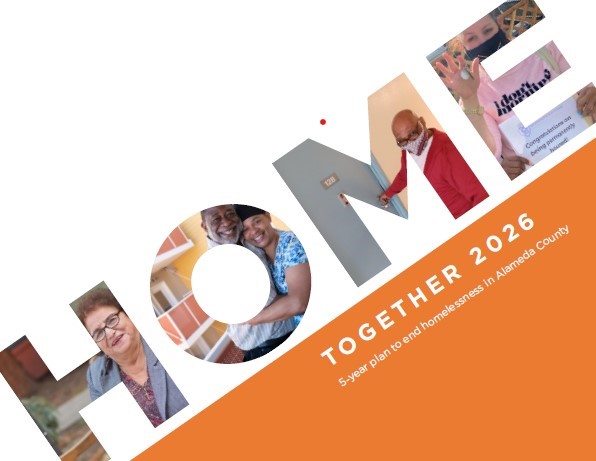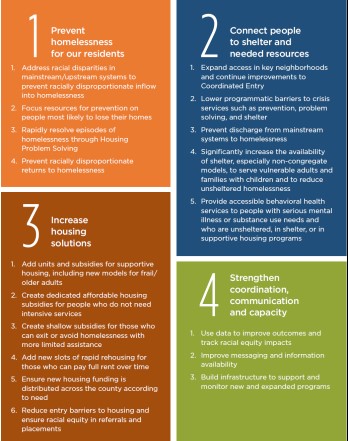HUD Awards $15 Million to Address Unsheltered Homelessness
The Alameda County Continuum of Care (CoC) was awarded $15 million over the next 3 years to support 5 new projects focused on serving people who are unhoused and living in encampments, outside, and in their vehicles. Alameda County’s CoC is one of only two CoCs in California to receive such an award.
According to the 2022 Point in Time Count, over 7,000 people are experiencing unsheltered homelessness in Alameda County. This critical funding will support our community’s ability to respond to this humanitarian crisis. A summary of the recommendations for funding priorities from the committee and workgroup of people with lived experience who contributed their experience to this Plan can be found here.
New projects that this funding award will support:
- Enhanced Care Vouchers (Office of Homeless Care and Coordination): This project will create 100 new permanent supportive housing units and provide enhanced care for people with chronic medical and mental health conditions.
- Navigate to Housing (City of Oakland): This new rapid rehousing project will provide rental assistance, case management, and housing search assistance with a focus on serving people living in encampments in Oakland.
- Housing Advocacy for Unsheltered Homelessness Seniors (Homeless Action Center-new to CoC funding): This program will offer trauma-informed advocacy and legal services for unsheltered seniors to increase their income and address barriers to housing.
- Neighbor to Neighbor Street Outreach (St. Mary's Center): This project will train specialized peer Outreach Ambassadors who will provide outreach and navigation services to seniors living in encampments, especially in West Oakland.
- Mobile Action Points (Office of Homeless Care and Coordination): This project will create new mobile access points into the Coordinated Entry system that will operate across five geographic zones to meet people where they are living and connect them quickly to resources.
Home Together 2026
The Home Together 2026 Community Plan lays out the goals, strategies and investments needed to dramatically reduce homelessness in Alameda County by 2026 and combat racial disparities in homelessness by fully centering equity.
The Plan was released in May of 2022 and adopted by the Alameda County Board of Supervisors, the Oakland, Berkeley/Alameda County Continuum of Care and mayors and city councils throughout the county.
The Home Together 2026 Community Plan recommends specific action steps in four categories:
|
 |
 |
The Home Together Year 2 Progress Update describes progress towards the Home Together 2026 goals during the second year of the Plan.
Community Care Expansion
Community Care Expansion in Alameda County
Alameda County is committed to creating and preserving housing and supportive services for our community, including for seniors and adults with disabilities who are at risk of or experiencing homelessness. Through funding from California’s Community Care Expansion (CCE) program, the County is working to address critical housing needs and improve access to healthcare, behavioral health services, and long-term care.
The CCE program, launched by the California Department of Social Services, aims to strengthen the continuum of care by preserving licensed residential care facilities, expanding treatment options, and increasing permanent housing opportunities for populations with complex health conditions.
With this transformative funding, Alameda County is collaborating with local service providers, housing developers, and healthcare organizations to implement innovative projects that:
- Preserve and Expand Housing: Maintain current housing and develop new housing options to provide stability for residents.
- Deliver Integrated Services: Offer wraparound services, including medical, behavioral health, and supportive care, to promote resident well-being and independence.
- Address Health and Safety Needs: Support critical facility improvements to enhance care environments for low-income and vulnerable populations.
By leveraging state investments, Alameda County continues to foster safe, affordable housing and comprehensive care solutions that prioritize dignity and wellness for all residents.
To learn more about how Alameda County and other communities are leveraging CCE funding, explore the CCE Grant Data Dashboard for detailed project insights.

Measure A1
The Measure A1 Affordable Housing General Obligation Bond program was approved by over 70% of voters in November 2016 and is being used to provide up to $580 million for the creation and protection of affordable housing options for Alameda County residents who need it most. Measure A1 provides significant new opportunities to assist renters, new homeowners, and those at risk of losing their homes. As of February 2019, $245 million in Measure A1 commitment had leveraged over $1.5 billion to support over 2,400 new affordable units in Alameda County
Additional information about Measure A1 can be via Alameda County’s Community Development Agency.
Homeless Housing, Assistance and Prevention (HHAP) Grant Program
The Homeless Housing, Assistance and Prevention Program (HHAP) is a block grant program designed to support regional coordination and expand or develop local capacity to end and prevent homelessness in local communities throughout the state of California. Funds are focused on moving homeless individuals and families into permanent housing and ensuring those individuals and families maintain their permanent housing. Read more about HHAP Rounds 1-5.
No Place Like Home
In 2018 California voters passed No Place Like Home, a $2 billion statewide bond program operated by California Housing and Community Development to create more supportive housing units throughout the state for homeless individuals and families struggling with a serious mental illness.
Community Health Record
The Alameda County Community Health Record (CHR) is an electronic record application that will summarize curated information from different organizations involved in consumer care. Qualified care coordinators and physicians will be able to access curated consumer information from multiple providers to coordinate care across organizations and have the ability to leverage consumer information to deliver the right care, at the right time, in the right place. Information from multiple providers including: physical health (inpatient, emergency departments, outpatient, primary care), mental health, housing resource centers, and social services can be used to coordinate care across organizations. Consumers will receive more efficient and effective care by allowing providers to share information that improves outcomes and accelerates the delivery of services.
For questions, please email CareConnectHelp@acgov.org or call 510-618-1997
